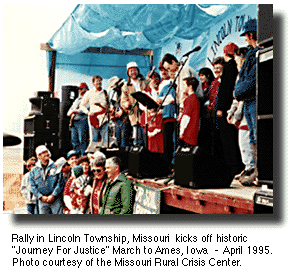|
Efficiency:
Family Farms and Factory Farms
National Campaign for Family Farms
and the Environment
Land Stewardship Project
Faribault, Minnesota
 A common argument in favor of factory livestock production is that it is an inevitable result of the industrialization of agriculture. Small to moderate-sized family farms cannot compete with the efficiencies of scale that come with giant confinement facilities, say boosters of the factory model. A common argument in favor of factory livestock production is that it is an inevitable result of the industrialization of agriculture. Small to moderate-sized family farms cannot compete with the efficiencies of scale that come with giant confinement facilities, say boosters of the factory model.
However, that argument holds little water. Economic analyses and on-farm research shows that when given fair access to markets, small to moderate-sized pork producers can out-compete the factories.
- Studies conducted at Kansas State University and the University of Illinois have found that the size of the hog production enterprise is not as important to profitability as the way it's managed.
- Iowa hog operations producing on average 1,260 pigs per year averaged five per cent less total costs per hundred pounds than large, specialized operations in North Carolina producing 5,000 hogs a year, according to Hogs Today magazine.
- Between 1989 and 1993, the most profitable large sow herds in Iowa were generating a profit of $12.32 per hundred pounds of pork produced. The most profitable small herds in that state earned $12.93 per hundred pounds during that same period, according to Iowa State University.
- In Minnesota, the fourth largest hog producing state in the country, case studies conducted by the Land Stewardship Project (LSP) and that state's department of agriculture show that small, diversified family farms are quite competitive financially. Four southern Minnesota grain and livestock farms using sustainable methods such as management intensive grazing and crop rotations attained a net income per acre that was more than three times the average of the area Farm Business Management Association farms. The four farms were more profitable despite being smaller than the average operation in the area.
- A farm case study being released by LSP later this year shows a small southern Minnesota operation producing hogs much more profitably than larger operations in the area. This 50-sow farrow-to-finish operation minimizes cost of production by using naturally-ventilated, low maintenance buildings and sustainable cropping methods. As a result, this family's total cost of production averages around 17 cents per pound less than the 13 top producing hog farms in their region.
But producing pork cheaply means little if there is no place to sell it. North Carolina farmers have learned that lesson the hard way. In the fall of 1993, corporate owned hogs were receiving $51 per hundred pounds to independent producers' $39, according to Hogs Today magazine. Mega-producers in that state often own large shares of packing and processing facilities, or, at the least, lock in exclusive contracts based on volume, giving them unfair market advantage.
The result? While North Carolina has increased its hog inventory by more than three million since 1986, the number of hog producers there has nose-dived from 15,000 to roughly 6,000.
Such a closed, farm-killing market system can be prevented. In Nebraska, where a tough corporate farm law has been credited with placing diverse family farmers on a more level playing field with vertically integrated factory operations, less than four per cent of the producers have left the hog business since 1986.
Family-sized operations are proving that on a cost-of-production basis, environmentally sound, moderate-sized hog operations can compete against highly capitalized, corporate style pork production. However, these family farmers cannot compete with the tax breaks, exclusive contracts, vertical integration, Wall Street investment clout and political favoritism that comes with being a corporate giant.
This information was compiled by the Land Stewardship Project, a private, non-profit organization devoted to fostering an ethic of stewardship for our nation's land and water and to creating and supporting environmentally, and socially sustainable agriculture systems. For further information on LSP, contact: Brian DeVore, LSP, 328 Central Ave. #5, Faribault, MN 55021. Telephone: (507) 334-0014, Fax (507) 334-0015.
For a copy of An Agriculture That Makes Sense: Profitability of Four Sustainable Farms In Minnesota, send S7.90 to: LSP, 2200 4th Street, White Bear Lake, MN 55110.
|



 A common argument in favor of factory livestock production is that it is an inevitable result of the industrialization of agriculture. Small to moderate-sized family farms cannot compete with the efficiencies of scale that come with giant confinement facilities, say boosters of the factory model.
A common argument in favor of factory livestock production is that it is an inevitable result of the industrialization of agriculture. Small to moderate-sized family farms cannot compete with the efficiencies of scale that come with giant confinement facilities, say boosters of the factory model.